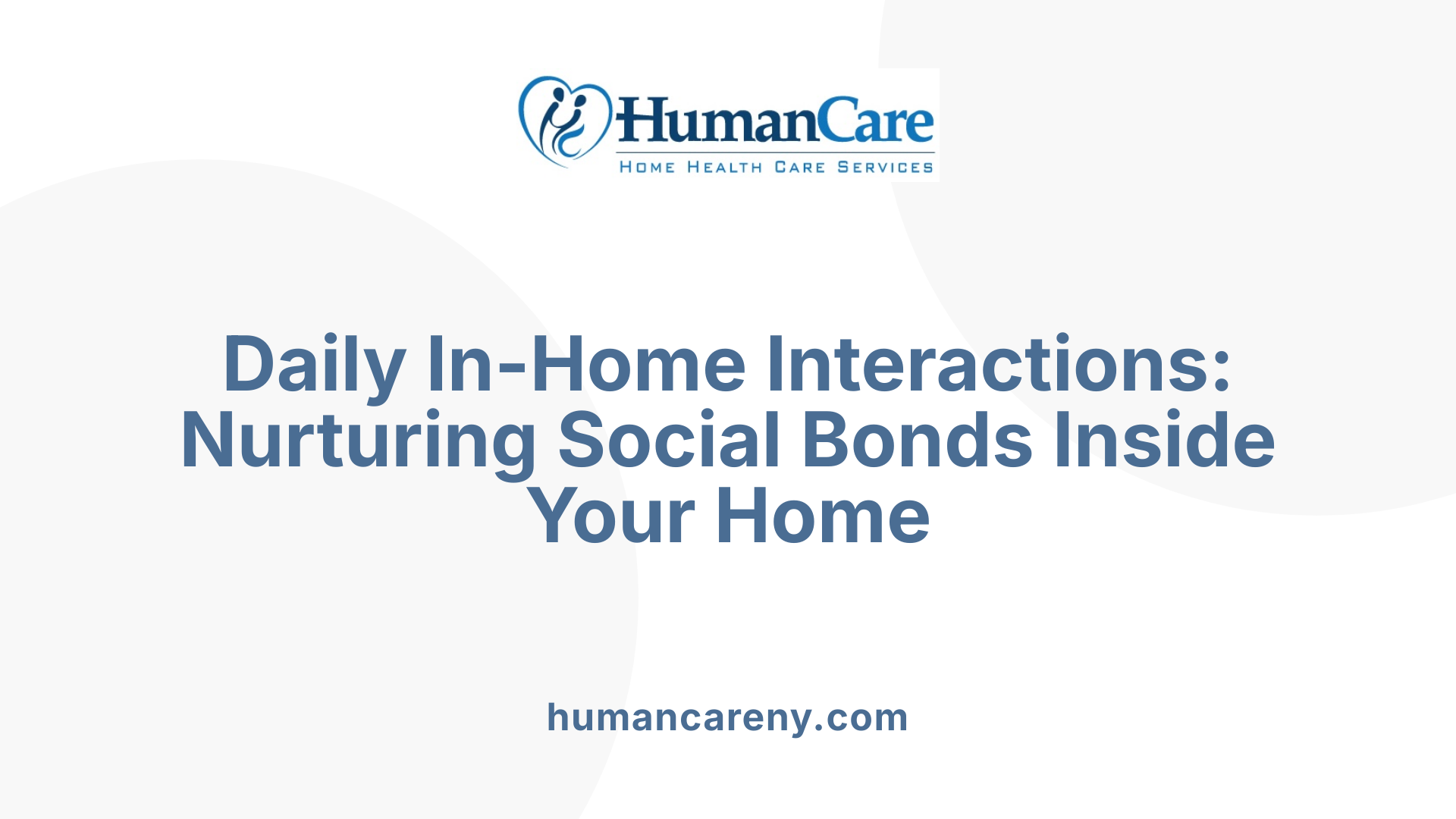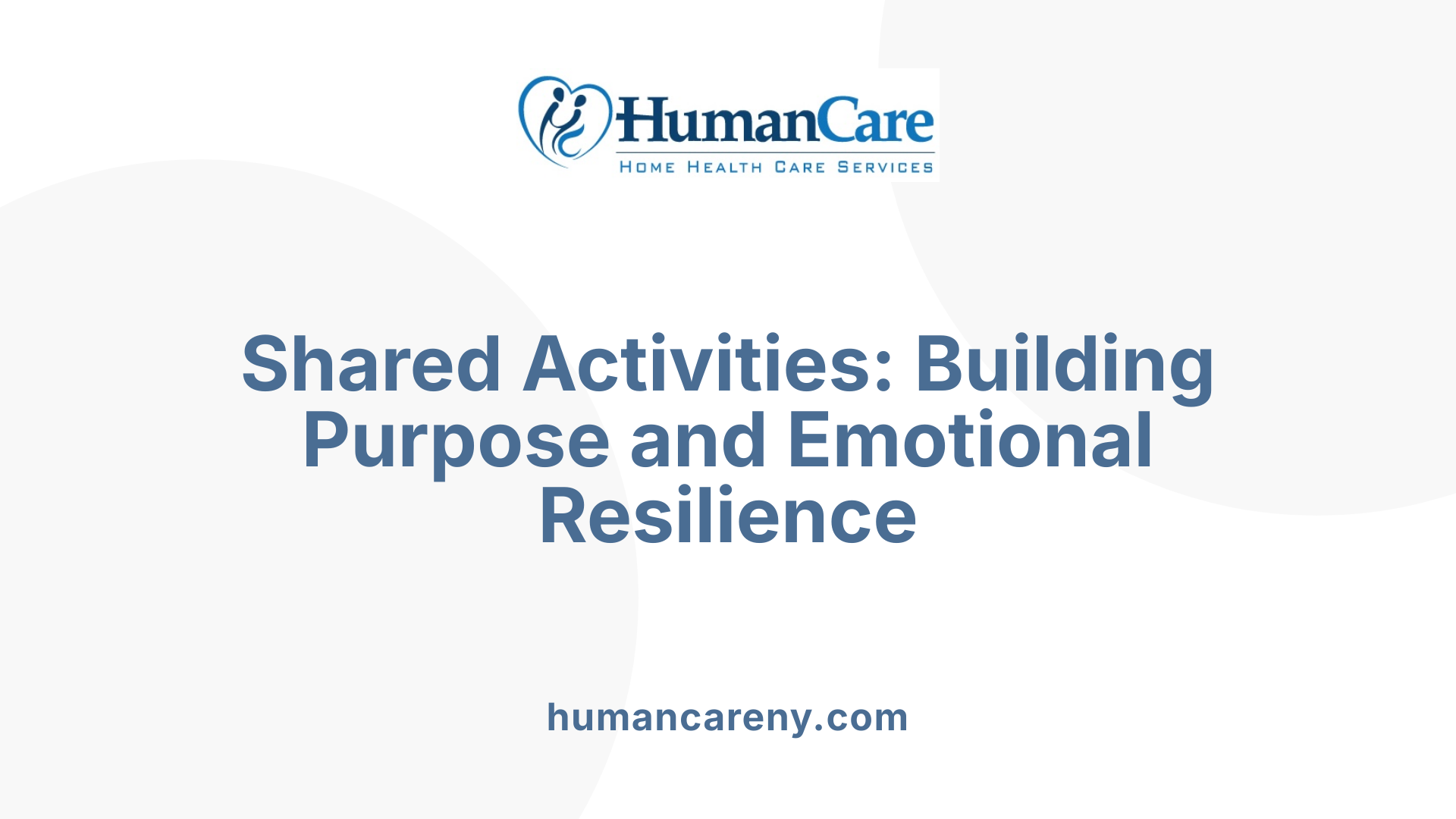Understanding the Role of Homemaking in Combating Social Isolation
social isolation is a prevalent issue among older adults, significantly impacting their mental and physical health. Homemaking services have emerged as a vital resource, providing not only daily assistance but also critical social engagement opportunities that foster emotional well-being and independence. This article explores how in-home care enhances social interaction for seniors, addressing barriers and promoting healthier aging through compassionate support and innovative strategies.
Facilitating Connection Through Daily In-Home Interactions

How do homemaking and in-home care services help reduce social isolation among the elderly?
Homemaking and in-home care services play a vital role in combating social isolation among seniors. These services offer more than just assistance with daily routines; they provide regular companionship and emotional support, which are essential for mental health.
Caregivers often engage seniors in meaningful conversations, participate in games, and encourage participation in hobbies like arts and crafts or reading. Such interactions foster a sense of belonging and help seniors feel valued. They also organize outings or accompany seniors to community events, further expanding their social networks.
In addition to face-to-face interactions, caregivers leverage technology to maintain social ties. They assist seniors in setting up and using devices for video calls, help navigate social media platforms, and facilitate virtual social activities. This technology-enabled communication allows seniors to stay connected with family and friends, even when in-person visits are limited.
By providing consistent companionship and tools for social engagement, homemaking and in-home care services effectively reduce feelings of loneliness, promote mental well-being, and contribute to overall healthy aging.
How does social interaction facilitated by homemaking services impact mental health and aging?
The social interactions enabled by homemaking services have a profound effect on the mental health of older adults. Regular conversations, participation in hobbies, and social outings help lower the risk of depression and cognitive decline.
Engaging in social activities stimulates the brain, promotes mental agility, and helps preserve cognitive functions. Moreover, these interactions foster a sense of purpose and belonging—elements crucial for emotional resilience.
Seniors who participate in social activities with the support of homemakers are more likely to maintain a positive outlook on life. This sense of connection not only enhances emotional well-being but also encourages healthier behaviors, physical activity, and engagement with the community.
Overall, homemaking services serve as an essential bridge that connects seniors with their community and loved ones, promoting a happier, healthier aging process.
| Aspect | Benefits | Details |
|---|---|---|
| Social Companionship | Reduces loneliness | Regular visits, conversations, and engaging activities foster emotional well-being |
| Use of Technology | Maintains social ties | Assistance with video calls, social media, and virtual activities |
| Community Engagement | Expands social networks | Accompaniment to social events and support for participation |
| Mental Health Impact | Prevents depression and cognitive decline | Stimulating social interactions enhance mental health |
| Overall Effect | Promotes healthy aging | Combines emotional support, community involvement, and mental stimulation |
This integrated approach through daily interactions and technological support ensures that seniors remain socially active, emotionally connected, and mentally engaged—fundamental components of quality aging.
More about how homemaking services promote social interaction for seniors
Homemaking services are tailored to meet the specific social needs of each individual. They focus on creating a supportive environment where seniors can enjoy meaningful relationships. Activities like shared meals, remote family chats, or participating in hobby groups help reinforce social bonds.
By providing a bridge to community activities and personal connections, these services enhance seniors' overall quality of life. The consistent presence and trust built with caregivers enable open communication about needs and preferences, further fostering social engagement.
In conclusion, homemaking and in-home care services are essential tools in the effort to reduce social isolation among older adults. They create opportunities for connection, support mental health, and contribute to a vibrant, engaged aging experience.
Creating Opportunities for Social Engagement Outside the Home
How can in-home care services be a solution to elderly social isolation?
In-home care services play a crucial role in reducing social isolation among seniors by actively supporting their participation in social activities beyond their homes. Caregivers help arrange transportation to community centers, social clubs, religious gatherings, and other local events. They assist with navigating public transport or private rides, addressing mobility issues, and ensuring safety during outings.
Additionally, caregivers facilitate outdoor and recreational activities such as nature walks, gardening, or physical exercises in parks. These activities have a calming effect, help lower stress levels, and provide mental stimulation. By creating structured opportunities for social interaction, in-home care programs help seniors stay connected with their community, sustain their independence, and enjoy a richer, more engaged life.
What are some simple ways for older adults to connect with others and reduce social isolation?
Older adults can adopt several straightforward strategies to build and maintain social bonds. Participating in local community activities, like attending neighborhood events, joining senior clubs, or enrolling in hobby groups such as gardening, crafts, or dancing, can provide regular social contact.
Regularly reaching out through phone calls, letter writing, or modern digital platforms like video calls on Zoom, Skype, or FaceTime helps seniors stay connected with distant family and friends.
Volunteering for community service or charitable organizations is another effective way to foster social interaction while giving back to the community.
Moreover, transportation services offered by caregivers or community programs enable seniors to attend social gatherings without worry about mobility or safety concerns. Engagement in adult day centers or support groups further enhances social participation, reducing loneliness and improving overall well-being.
Enhancing Emotional Well-being Through Shared Activities and Purposeful Engagement

What activities can help seniors stay socially connected and mentally stimulated?
Engagement in activities such as baking, arts and crafts, and educational courses plays a vital role in enriching the lives of seniors. Participating in these pursuits not only provides mental stimulation but also offers opportunities for social interaction. For example, seniors can join art classes or cooking groups, which enable them to connect with peers who share similar interests. These activities foster creativity, promote a sense of accomplishment, and help combat feelings of loneliness.
In-home care services often facilitate these activities by providing structured opportunities for seniors to engage in hobbies comfortably within their homes. Caregivers might encourage baking sessions, craft projects, or watching educational videos together, making these moments both enjoyable and beneficial for mental health.
How does helping others contribute to seniors’ emotional health?
Volunteer activities such as writing encouragement cards, assembling care packages, or making blankets can significantly enhance a senior’s sense of purpose and social connection. When seniors help others, they experience feelings of contribution and worth, which are crucial for emotional well-being.
In-home care agencies often support seniors in participating in these altruistic activities, whether by guiding them in creating handmade gifts or organizing community service projects. These acts of kindness promote positive emotions, reduce feelings of social isolation, and strengthen connections with others.
Why is pursuing hobbies and lifelong learning beneficial?
Continuing education and hobbies stimulate the mind and provide a routine that contributes to a senior’s overall mental health. Participating in online courses, book clubs, or gardening groups helps keep cognitive functions sharp and offers ongoing social interaction.
Many in-home care providers assist seniors in accessing adult day services or community programs that offer classes tailored to their interests, ensuring they remain engaged and socially active. These experiences foster self-esteem and a sense of community, which are essential in maintaining emotional resilience.
How do homemaking and in-home care services combat social isolation?
Homemaking and in-home care services are essential in reducing feelings of loneliness among seniors by providing regular social interaction. Caregivers regularly converse with seniors during routine activities, such as preparing meals, tidying up, or planning outings, which helps seniors feel valued and connected.
Moreover, these services facilitate participation in hobbies, community activities, and social outings, strengthening ties with family and friends. Caregivers also support the use of technology, such as setting up video calls, social media, or virtual classes, which expands seniors’ social networks.
Research indicates that consistent in-home support not only helps fulfill daily needs but also enhances emotional well-being by preventing social isolation and fostering meaningful relationships.
What are additional ways to promote social connectedness and emotional health?
Supporting seniors in their efforts to stay connected involves multiple strategies, including:
| Strategy | Description | Impact |
|---|---|---|
| Participating in community programs | Joining local clubs or classes tailored for seniors | Builds social networks and reduces loneliness |
| Engaging in hobbies and interests | Crafting, gardening, or participating in hobby groups | Promotes mental stimulation and social bonds |
| Using technology | Video chat platforms like Zoom or FaceTime | Keeps seniors connected with loved ones |
| Facilitating outings | Supporting visits to parks, museums, or religious services | Encourages physical activity and social engagement |
| Pet companionship | Therapy animals and pet visit programs | Offers emotional support and companionship |
| Support groups and volunteer work | Opportunities to give back and connect with peers | Fosters a sense of purpose and community |
Summarizing the importance of shared activities for seniors’ mental health
Engaging in shared, purposeful activities helps seniors maintain their cognitive health, emotional well-being, and social connections. These pursuits boost self-esteem, create a sense of belonging, and alleviate feelings of loneliness.
Home care services, by providing physical assistance and emotional support, serve as a bridge for seniors to participate actively in their communities and hobbies. The consistent presence and engagement of caregivers promote a positive social environment, essential for healthy aging.
Ultimately, promoting social activity and purpose through various activities and support systems can greatly improve the quality of life for older adults, making aging a more fulfilling and connected experience.
Addressing Barriers and Building Resilience in Elderly Social Networks

How can in-home care services be a solution to elderly social isolation?
In-home care plays a vital role in reducing social isolation among seniors by offering personalized support tailored to individual needs. Caregivers assist with overcoming physical, sensory, and cognitive barriers that may hinder social engagement. For instance, they facilitate conversations, accompany elders on outdoor activities, and help them use communication technologies like smartphones, tablets, or video calling platforms, ensuring consistent contact with family and friends.
Moreover, caregivers are trained to recognize signs of social withdrawal and can actively encourage participation in social activities, whether in the home or the community. This regular emotional support fosters trust and a sense of belonging, which significantly diminishes feelings of loneliness and isolation.
What comprehensive approaches can help address social isolation in elderly individuals?
Effectively combating social isolation requires a holistic strategy involving various interventions and support systems. These include:
- Community programs and social groups that provide structured social interactions.
- Accessible transportation services to enable participation in social outings, events, and appointments.
- Mental health support, such as counseling and support groups, to address emotional barriers.
- Training in social skills and communication to help seniors build confidence in social settings.
- Technology assistance to enhance digital literacy, enabling seniors to communicate via video calls, emails, and social media.
Collaborative efforts between healthcare providers, community centers, family members, and volunteers are essential in creating sustainable, engaging environments that promote resilience and active participation.
Overcoming barriers through targeted strategies
To build connected and resilient social networks, addressing specific challenges faced by seniors is crucial. These include:
| Barrier Type | Strategy | Description |
|---|---|---|
| Mobility issues | Transportation services, home modifications | Ensuring access to places and activities or making homes more accessible. |
| Sensory impairments | Assistive devices, adapted communication methods | Using hearing aids, visual aids, or sign language assistance. |
| Cognitive limitations | Memory aids, simplified activities | Employing reminder systems and engaging in cognitive-stimulating activities. |
| Technology gaps | Training sessions, user-friendly devices | Teaching seniors how to operate digital tools to stay connected. |
Training programs in social skills and communication can empower elders to participate more confidently in social interactions. Equally, facilitating access to reliable transportation and easy-to-use technology creates pathways for ongoing social engagement.
Implementing these combined strategies fosters an environment where seniors can overcome barriers, develop resilience, and maintain meaningful connections, thereby supporting their mental and physical health.
The Unique Role of Homemaker Services in Supporting Independence and Well-Being

What are some simple ways for older adults to connect with others and reduce social isolation?
Encouraging regular communication with loved ones and community members is essential. This can be achieved through phone calls, letter writing, and digital platforms like social media or video chats. Participating in local community activities or social clubs also fosters a sense of belonging.
Leveraging technology is particularly helpful — tools like tablets and smartphones can enable virtual visits and online social groups.
Homemaker services play a vital role here by helping older adults with daily routines, such as setting up devices, providing assistance in navigating social media, or arranging transportation to social outings. These services not only support functional needs but also promote emotional bonds and social engagement, helping seniors feel connected and less isolated.
How do homemaking and in-home care services help reduce social isolation among the elderly?
Homemaking and in-home care are tailored to meet individual needs, creating opportunities for meaningful social participation.
Caregivers assist with everyday activities, encouraging seniors to engage in hobbies, community programs, or outings. They also provide companionship during routines like cooking or reading, helping to alleviate feelings of loneliness.
By facilitating social interactions and providing emotional support, these services foster a sense of independence and control for seniors. Regular visits from familiar caregivers build trust and emotional connection, which are crucial for mental health.
Furthermore, caregivers can coordinate with family and community resources to enhance social opportunities. The personalized approach supports older adults in maintaining their social networks, sustaining mental well-being, and enjoying a higher quality of life.
| Aspect | Description | Additional Details |
|---|---|---|
| Personal Care Plans | Tailored strategies that address individual health, lifestyle, and social needs | Designed to promote independence and adapt to changing conditions |
| Assistance with Daily Routines | Help with grooming, meal prep, household chores | Ensures basic needs are met while encouraging routine participation |
| Fostering Independence | Encouraging involvement in hobbies, outings, and social activities | Supports self-esteem and emotional well-being |
| Emotional and Social Support | Companionship, conversation, facilitation of social outings | Combats loneliness and stimulates mental health |
This personalized support model underscores the importance of social connection and autonomy for older adults, indicating that well-structured homemaker services are fundamental in enriching their social lives and emotional health.
The Impact of Homemaking Services on Noteable Health Outcomes

How does social interaction facilitated by homemaking services impact mental health and aging?
Homemaking services play a significant role in promoting social engagement, which is vital for mental health among seniors. By offering companionship and assisting with activities like conversations, hobbies, and community outings, these services effectively reduce feelings of social isolation and loneliness.
Social interaction helps stimulate cognitive functions, which is critical in slowing cognitive decline. Engaging in mental activities, such as reading, puzzles, or shared hobbies, keeps the brain active and resilient. Additionally, social participation encourages physical movement—taking walks, gardening, or participating in group exercises—that supports physical health.
The emotional benefits also include lower levels of depression and anxiety. Regular, trusting relationships with caregivers provide a sense of security and belonging, which can reduce stress and promote emotional well-being. In essence, social interactions facilitated by homemaking services help seniors age with dignity and maintain their mental sharpness while fostering a positive outlook.
What are the benefits of homemaking services in promoting social engagement and emotional well-being for seniors?
Homemaking services significantly contribute to emotional stability by providing consistent companionship and support. These services help seniors stay connected to their community and loved ones through regular visits, phone calls, and the encouragement of social activities.
By reducing feelings of loneliness and fostering a sense of purpose—such as helping others through card writing or craft projects—these services boost seniors’ mood and self-esteem.
Homemakers also assist in maintaining independence by helping with daily routines and household management, which diminishes stress related to mobility or cognitive challenges. As a result, seniors experience a greater sense of control over their lives, enhancing their overall resilience.
Moreover, these supportive interactions help sustain mental activity and emotional health, reducing the risk of depression and promoting a balanced, positive state of mind. Ultimately, homemaking services serve as a vital component in supporting healthy, engaging, and joyful aging.
The Importance of Addressing Social Isolation in Aging
Social isolation among older adults is a growing concern linked to adverse health outcomes like depression, cognitive impairment, and increased mortality. It can also lead to physical health problems such as high blood pressure, poor nutrition, and mobility issues.
Recognizing the signs early—such as withdrawal, neglect of personal hygiene, or behavioral changes—is crucial. Prevention strategies include regular social activities, technological engagement like video calls, community participation, and fostering strong support networks.
Home care services, including homemaking and companionship, are essential in this effort. They create opportunities for connection, help monitor health changes, and encourage participation in activities that provide mental and physical stimulation.
Strategies and Technologies to Combat Loneliness
Using technology—smartphones, tablets, and applications like Zoom and FaceTime—enables seniors to communicate more easily with loved ones. Care providers trained to support seniors in mastering these tools help bridge gaps caused by mobility or geographic barriers.
Community programs, volunteer support, pet therapy, and group exercises offer additional avenues for meaningful social interactions. Intergenerational activities and cultural events further bolster a sense of community.
Transportation services are critical in helping seniors attend social events, enhancing their social networks. Support groups and respite care can also reinforce emotional health by providing outlets for sharing experiences and practical advice.
Impact of Regular Socialization on Health
Consistent social engagement has proven benefits: it reduces depression, improves self-esteem, and fosters a positive attitude. It encourages physical activity, which benefits cardiovascular health, mobility, and overall vitality.
Studies emphasize that seniors who participate actively in social settings tend to have better mental health, fewer cognitive issues, and improved quality of life. Regular interaction can also facilitate early detection of health concerns, leading to prompt interventions.
Role of In-Home Care in Reducing Isolation
In-home care services serve as a vital pillar in the battle against senior loneliness. Caregivers provide companionship through conversations, hobbies, outings, and technological support.
They help organize social activities, assist with communication enhancements, and facilitate community participation. Regular visits and emotional support from trained caregivers foster feelings of belonging and emotional stability.
Transportation assistance further enables seniors to attend social events, visit family, or partake in community programs, promoting ongoing social engagement.
Benefits of Social Connections on Health Outcomes
Research from reputable health agencies highlights that strong social ties correlate with reduced depression and anxiety, lower blood pressure, and longer life expectancy. Socially active seniors tend to enjoy better cognitive functioning and more independence.
Conversely, social isolation increases the risks of cognitive decline, cardiovascular issues, and early mortality.
Encouraging social participation through home care services, community involvement, and technology supports healthier aging processes.
Addressing Barriers and Enhancing Social Opportunities
Barriers such as mobility impairments, hearing or vision loss, and limited access to technology can hinder social engagement. Tailored support from caregivers—like help with devices or transportation—can overcome these challenges.
Family members and community organizations can collaborate to create accessible social opportunities, including cultural events, hobby groups, and faith-based activities.
Final Insights
Overall, integrating socialization efforts into in-home care practices significantly impacts seniors’ mental and physical health. fostering social bonds, providing emotional support, and promoting community involvement help older adults lead healthier, more fulfilling lives. As society continues to recognize these benefits, expanding access to homemaking services and supportive programs remains paramount in promoting a vibrant, connected aging population.
Summative Reflection: The Holistic Benefits of Homemaking for Older Adults
How can in-home care services be a solution to elderly social isolation?
In-home care services play a crucial role in reducing social isolation among seniors by providing consistent companionship and emotional support. Caregivers engaged in these services often build trusting relationships with their clients, which fosters emotional stability. These professionals assist with social outings and encourage interactions with family, friends, and community groups, whether through accompanying seniors to social events or helping them stay connected via digital tools like video calls and social media.
The availability of personalized support helps seniors feel valued and less alone, addressing both mental and physical health needs. Moreover, in-home caregivers are trained to notice signs of loneliness and emotional distress, intervening with appropriate activities or referrals that enhance social engagement. The combination of regular interaction, facilitation of community participation, and use of technology significantly mitigates feelings of loneliness, contributing to better mental health and overall well-being.
What strategies can homemaking services employ to alleviate loneliness in older adults?
Homemaking services implement various strategies aimed at alleviating social isolation and fostering a sense of purpose among seniors. Regular visits from trained caregivers not only provide routine assistance but also serve as vital social contact points. These visits often include engaging activities such as playing games, doing arts and crafts, or sharing meals, which promote mental stimulation and social interaction.
Furthermore, homemaking services assist seniors in leveraging technology by setting up devices like tablets or smartphones and teaching them how to use applications such as Zoom, Skype, or FaceTime. This digital literacy enables older adults to communicate with loved ones and participate in virtual social activities.
Encouraging participation in community programs, supporting hobbies such as gardening or crafting, and promoting volunteer activities like writing encouragement cards or assembling care packages help seniors find purpose and build social bonds. Additionally, facilitating connections with local clubs, support groups, and faith-based organizations creates ongoing opportunities for engagement.
Many homemaking programs also emphasize the importance of outdoor activities, such as walks or nature excursions, which can reduce stress and improve mood amid social interactions.
Mental health benefits
Engagement in meaningful activities and social interactions through homemaking services offers substantial mental health benefits. Seniors experience reduced depression and anxiety, improved mood, and a greater sense of belonging. Techniques like practicing mindfulness, gratitude, prayer, and meditation further enhance psychological resilience.
Social network expansion
By fostering opportunities for seniors to connect with others—whether through community outings, hobby groups, or social support networks—homemaking services expand social circles and reinforce existing relationships. This social network expansion can significantly decrease feelings of loneliness and social withdrawal.
Physical health improvements
Regular social activity along with assistance with daily routines encourages physical movement, which improves physical health. Activities like walking, gardening, or participating in exercise groups promote mobility, cardiovascular health, and overall fitness. Additionally, social support often leads to better adherence to medication regimens and healthier lifestyle choices.
A comprehensive table summarizing these benefits is provided below:
| Benefit Category | Examples of Strategies | Impact on Seniors |
|---|---|---|
| Mental Health | Activities, mindfulness, social engagement | Reduced depression, anxiety, improved mood |
| Social Networks | Community participation, technology use, support groups | Enhanced social bonds, sense of belonging |
| Physical Health | Outdoor walks, exercise groups, routine assistance | Improved mobility, cardiovascular health, independence |
The holistic approach of in-home and homemaking services ensures that older adults maintain their independence, stay socially engaged, and enjoy a high quality of life. This comprehensive care addresses emotional, social, and physical needs, ultimately fostering healthier, happier aging.
Fostering a Connected Future for Aging Populations
Homemaking services serve as a vital bridge that reduces social isolation among the elderly by fostering meaningful social connections, supporting independence, and enhancing well-being. Through tailored activities, community engagement, and emotional support, these services help seniors maintain active, fulfilled lives. As the aging population grows, investing in comprehensive homemaking programs is essential for fostering healthier, more resilient communities where older adults feel valued, connected, and supported.
References
- Six Ways In-Home Care Services Can Reduce Social Isolation in ...
- Elderly Isolation: Combating Loneliness Through Home Healthcare
- Reducing Social Isolation For Seniors at Home - Americare
- 5 Creative Approaches To Combat Senior Loneliness With In-Home ...
- The Role of At-Home Care in Overcoming Senior Isolation
- Use of home and community-based services and loneliness in older ...
- In-Home Care Services Can Helps Reduce Senior Loneliness and ...
- Factors influencing loneliness among older people using homecare ...
- Elder Care in Home: Strategies to Prevent Social Isolation in Seniors



